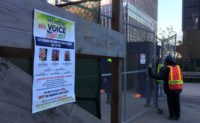Liability
Conspiracy to Fake Injuries Claimed by New York Contractors and Insurer Lawsuit

The Center for Construction Research and Training report identified 408 fatalities among Hispanic construction workers.
Photo by Thanumporn Thongkongkaew/Getty Images
Three New York specialty contractors and a reinsurance carrier have filed racketeering lawsuits against what they claim is a network of law firms, medical practices and members of a single Queens, N.Y., family that defrauded the insurer and firms in workers compensation claims over phony and staged workplace accidents.
The newest lawsuit was filed in federal district court in New York City by insurer Ionian Re, a captive insurer of Skyline Restoration Inc. That company is also plaintiff along with two other restoration contractors, Urban D.C. Inc. and DNA Contracting & Waterproofing.
The new lawsuit also expands on the first lawsuit, filed in October in the same court, by featuring a network diagram—labeled the "family tree"—featuring photos of faces and showing relationships linking those involved.
All alleged staged accidents occurred in the New York City area.
In the second lawsuit, Ionian Re and the contractors charge that since at least 2017, the conspirators groomed and recruited construction workers for staged and faked accidents, filed fraudulent workers' compensation claims and personal injury lawsuits and provided or allegedly provided medical treatment to inflate the value of the claims.
In each case, the claimants would stage an accident, often unwitnessed, according to the lawsuits, and then in short order ask to be taken by ambulance or driven to a hospital, be released and then file a claim or lawsuit, sometimes for as much as $8.5 million in anticipated medical costs.
The alleged victims would then go to medical practices that would prescribe treatment to build up the claims cost.
A principal of the personal injury law firm named as lead defendant in the first lawsuit, Gorayeb & Associates, could not immediately be reached for comment.
One of the medical practices named as a defendant has filed the first formal response to the October lawsuit, claiming that it fails to state an actionable claim and fails to justify use of the racketeering statute.
Insurers have been making increasing use of racketeering statutes to combat alleged fraud, a practice that is at least a decade old.
The lawsuits also need to be considered in light of New York's unique workplace injury insurance environment. State scaffold laws 240 and 241, which date to 1878, hold project owners and contractors 100% liable when a worker sustains a fall-related injury. The laws have added hundreds of millions of dollars to the cost of construction and helped drive several insurers out of the market.
The ones that remain "have raised their premiums significantly to offset their increased risk," writes Gary Wallach of Larchmont, N.Y.-based broker BGES Group.
Efforts by business owners and insurers to repeal or modify the laws have been unsuccessful against defenses mounted by a combination of worker advocates and personal injury lawyers. How much the scaffold laws contribute to insurance fraud is not clear.
This article was updated on Jan. 21 to clarify the plaintiffs in the lawsuit.




